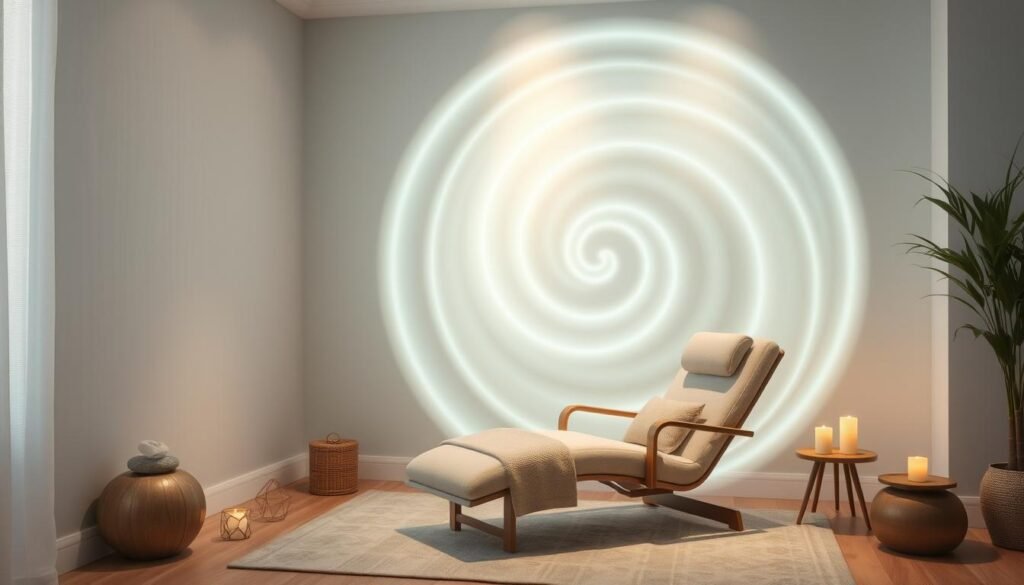Did you know hypnosis can really help with anxiety disorders? This fact shows how hypnotherapy might be a natural solution. Nowadays, as life gets busier, many people want non-drug ways to deal with anxiety. Hypnotherapy uses relaxation and positive ideas to fight anxiety symptoms.
Anxiety often comes from stress, bad experiences, or tough relationships. Hypnotherapy works on the subconscious to help control feelings. This makes dealing with anxiety easier. Certificates from the American Society of Clinical Hypnosis or the National Guild of Hypnotists mean you’re in good hands. This treatment can make you more relaxed, ease anxiety, and help you feel calmer.
Key Takeaways
- Hypnosis can significantly relieve anxiety disorders.
- It induces deep relaxation to counter physiological anxiety symptoms.
- Hypnotherapy aids in better emotional regulation during anxiety episodes.
- Qualified providers ensure safe and effective treatment pathways.
- Hypnotherapy can address specific anxiety disorders like phobias and PTSD.
Understanding Anxiety Disorders
Anxiety disorders can greatly affect your day-to-day life. They happen when anxiety gets too intense, stopping you from doing normal tasks. Figuring out the different kinds of anxiety and their signs is key. It helps find the right treatment, like hypnotherapy, to deal with them.
Types of Anxiety Disorders
There are many types of anxiety disorders, each with its own issues. Some common ones include:
- Generalized Anxiety Disorder: This is when you worry too much about daily things, and it’s hard to keep anxiety in check.
- Panic Disorder: It’s known for sudden panic attacks. You might feel extreme fear and have symptoms like a fast heartbeat or trouble breathing.
- Social Anxiety Disorder: This leads to major stress in social scenes. It can make you avoid meeting people, which affects your work and personal life.
- Phobias: These are strong fears of specific things or situations, causing intense anxiety reactions.
Common Symptoms of Anxiety
Anxiety can show up in many ways, depending on the person and type of disorder. Knowing these symptoms can help you understand what you or others might be going through. Usual signs include:
- Constant worry about many things
- Feeling restless or on edge
- Having a rapid heartbeat or sweating
- Struggling to focus or blanking out
It’s critical to address these symptoms to avoid a drop in how well you live. Methods like hypnotherapy can offer powerful ways to get better at handling these issues.
What is Hypnotherapy?
Hypnotherapy is a strong healing way that uses hypnosis to help people handle mental health problems, like anxiety. It lets therapists explore the subconscious mind, which helps in healing emotions. By using hypnosis for anxiety, experts can guide one towards positive changes and emotional ease.
The Difference Between Hypnosis and Hypnotherapy
Hypnosis and hypnotherapy are not the same, even though people often mix them up. Hypnosis is an altered state of consciousness with deep focus. It lets people tap into their subconscious. On the other hand, hypnotherapy uses this state for therapeutic purposes to lessen psychological pain.
A key part of therapy hypnosis is the guidance of a professional hypnotherapist. They use proven techniques to help face anxiety safely. Having a trained expert ensures the therapy works right and meets the goals set.
Self-hypnosis is another way to deal with anxiety. With it, you can apply hypnotherapy’s benefits on your own. It’s all about using relaxation methods and positive thoughts to manage emotions better. While professional hypnotherapy lays the groundwork, self-hypnosis is an extra support for those tackling their anxiety.

How Hypnotherapy for Anxiety Works
Hypnotherapy is a strong tool for those battling anxiety. It uses induction techniques and hypnotic suggestion for anxiety relief. Together, they help reduce anxiety greatly.
Induction Techniques in Hypnotherapy
Induction techniques help create a trance state. This state gets the mind and body ready for significant change. Common techniques in hypnotherapy include:
- Progressive Muscle Relaxation: This involves tensing and then relaxing different muscle groups. It brings both physical and mental calm.
- Focused Breathing: By focusing on deep, steady breaths, it lowers stress and improves relaxation.
- Guided Imagery: This uses vivid mental pictures to build a peaceful setting. It boosts relaxation and comfort.
Using these induction techniques sets the stage for suggestions that directly address anxiety. Most people will need several sessions, which usually last between 50-60 minutes, for the best outcome.
The Role of Suggestion in Reducing Anxiety
Suggestions during hypnotherapy are vital in changing how we react to stressors. Hypnotic suggestion for anxiety relief includes positive statements and visualizing achievements to alter emotional responses. For example:
- Positive affirmations boost self-confidence.
- Imagining success reduces fear in stressful situations.
- Adopting a peaceful mindset ensures the lasting effect of therapy.
Studies show that these suggestions greatly aid in changing behavior and improving emotional health. Hypnotherapy is a valuable method for anxiety management, especially as an alternative to conventional options. Discover more about hypnotherapy here.

| Technique | Description | Benefits |
|---|---|---|
| Progressive Muscle Relaxation | Tensing and relaxing muscle groups | Reduces physical tension and promotes calm |
| Focused Breathing | Concentrating on deep, thorough breaths | Enhances relaxation and focus |
| Guided Imagery | Visualization of calming scenarios | Creates a sense of peace and well-being |
Combining these techniques with effective suggestions shows how hypnotherapy can positively affect those facing anxiety.
Benefits of Hypnotherapy for Anxiety Management
Hypnotherapy offers a unique and natural approach to anxiety relief. It stands out from traditional treatments. People look for ways to manage anxiety without the side effects. The benefits of hypnotherapy include relaxation and a positive mindset.
Natural Approach to Anxiety Relief
Hypnotherapy is a significant natural anxiety relief. Around 40 million Americans battle anxiety each year. They need effective treatment options. Hypnotherapy taps into the mind to calm emotions and lower anxiety. It makes the brain more responsive to positive emotions and less self-aware.
Effectiveness in Different Types of Anxiety Disorders
Various anxiety disorders respond well to hypnotherapy. These include generalized anxiety, panic attacks, and social anxiety. Studies show it has immediate and lasting effects. A 2019 study found hypnotherapy lowered anxiety by more than 79%.
Hypnotherapy works best with other treatments like cognitive-behavioral therapy. This mix can help especially with anxiety from stress, like medical fears. For more tips on managing anxiety, check out this resource.

| Type of Anxiety Disorder | Hypnotherapy Effectiveness | Additional Benefits |
|---|---|---|
| Generalized Anxiety Disorder | High | Improved emotional control |
| Panic Attacks | Moderate | Reduction in symptoms |
| Social Anxiety | High | Increased self-confidence |
| Post-Traumatic Stress Disorder | Moderate | Enhanced relaxation |
In conclusion, hypnotherapy is beneficial for managing anxiety. It combines a natural approach with proven results. This makes it an attractive option for those seeking anxiety relief.
Relaxation Techniques: A Foundation for Hypnotherapy
Relaxation techniques are key for successful hypnotherapy to reduce anxiety. These methods ready the mind and body for deeper healing. They also make a perfect setting for relaxation hypnosis aimed at anxiety.
Common techniques include:
- Deep breathing: This helps calm the nerves and lessen tension, leading to peace.
- Visualization: By imagining calm scenes, one can temporarily step away from stress, boosting relaxation.
- Progressive muscle relaxation: Focusing on tightening and then relaxing muscles helps ease physical stress.
Studies back up the value of these techniques for stress management. One study in the International Journal of Clinical and Experimental Hypnosis showed that hypnotherapy and relaxation strategies greatly lowered stress and anxiety. This proves how these relaxation methods can significantly improve mental well-being.
To manage anxiety well, using these relaxation methods daily is crucial. Mastering these techniques prepares one mentally for hypnotherapy. It opens a clear route to managing emotions and changing negative thoughts.
Self-Hypnosis Techniques for Anxiety Relief
Self-hypnosis offers a powerful way to manage anxiety. It teaches relaxation and focus. With these skills, you can make your own hypnotic suggestions. These suggestions can fight anxiety and improve your mental health.
Steps to Perform Self-Hypnosis
Here’s how to start self-hypnosis for anxiety relief:
- Find a Quiet Space: Look for a comfy, quiet spot with few distractions.
- Relax Your Body: Use deep breaths or muscle relaxation to calm down.
- Enter a Calm State: Focus on your breathing or visualize to find calm.
- Provide Affirmations: Say calming things to yourself, building relaxation and confidence.
- Create Hypnotic Suggestions: Make specific suggestions to help handle stress better.
- Visualize Outcomes: Imagine dealing with stress smoothly.
- Gradually Return: Slowly, come back to the moment after some time.
Creating Effective Hypnotic Suggestions
Making good hypnotic suggestions is key for DIY anxiety therapy. They should be:
- Personalized: Make suggestions for your own needs.
- Positive: Keep suggestions upbeat, focusing on solving issues.
- Simple: Use easy phrases that stick in your mind.
- Present Tense: Act as if the good changes are happening now. This boosts belief and focus.
With practice, self-hypnosis can be a great tool for relaxation and fighting anxiety. It’s free and has no bad side effects. This makes it a great choice for those looking for relief. Over 280 million people worldwide deal with anxiety disorders. Learning self-hypnosis could make a big difference for many.
Scientific Research Supporting Hypnotherapy for Anxiety
Recent studies highlight hypnotherapy’s benefits for managing anxiety. These studies show changes in the brain during hypnosis, proving it’s an effective treatment. This is important in understanding hypnotherapy’s role compared to other methods.
Studies on Hypnosis and Brain Activity
Research on brain activity during hypnosis has been eye-opening. It reveals that hypnosis helps with emotional control and lessens pain. People react differently to hypnosis, with some showing strong effects.
Those who are highly suggestible to hypnosis tend to see faster, more dramatic benefits. This shows hypnotherapy’s power in treating anxiety and more.
Comparisons with Other Anxiety Treatments
When looking at how hypnotherapy stacks up against traditional treatments for anxiety, it shines. Meta-analyses prove hypnosis complements methods like cognitive-behavioral therapy (CBT) well. A review of 49 meta-analyses covering 261 studies showcases hypnotherapy’s broad effectiveness.
Therapists often find hypnosis boosts their treatment plans. It has a solid place in treating anxiety and similar issues.
Hypnotherapy Approaches for Specific Anxiety Issues
Hypnotherapy offers tailored strategies for various anxiety challenges. These include panic attacks, social anxiety, and phobias. It uses specific techniques for each condition, enhancing the experience. By tapping into the subconscious, it helps change beliefs that cause anxiety. This makes hypnotherapy a great choice for treating specific anxiety types.
Hypnotherapy for Panic Attacks
Panic attacks can leave you feeling very scared. Hypnotherapy uses relaxation methods to help during these episodes. It teaches coping strategies. People learn to view panic triggers differently, gaining control. Stories show that hypnotherapy can help reduce panic attacks and boost confidence.
Hypnotherapy for Social Anxiety
Social anxiety involves a fear of being judged. Hypnotherapy helps individuals face and change negative self-beliefs. This process builds self-awareness and strength, swapping self-doubt for positive thoughts. Techniques like visualization prepare them for social situations, easing anxiety and improving comfort in public.
Hypnotherapy for Phobias
Phobias cause intense fears of specific things. Hypnotherapy for phobias uses desensitization, exposing individuals to their fears gently. This method lessens the phobia’s effect over time. Personalized sessions help clients safely face their fears with a therapist’s help. For more on hypnotherapy’s therapeutic uses, see hypnotherapy and anxiety management.